- Home
- P. D. James
Time to Be in Earnest Page 2
Time to Be in Earnest Read online
Page 2
Even so, life at Colebrook House seems to have been tough. The boys were woken at 7 o’clock in the morning throughout the year and were required to wash in cold water. Breakfast at 8 o’clock consisted of thick slices of bread and dripping, known as “toke,” though occasionally there was fish paste or marmalade. The only morning on which a cooked breakfast was provided was on the last day of term when the boys would be given a boiled egg before their journey home. My grandfather was obviously anxious that the school should emulate more famous preparatory schools and the boys wore Eton suits, mortarboards and carefully blacked boots. They would make their way in a crocodile to the Cathedral, first of all for practice and then for Mattins, which lasted for three-quarters of an hour and was followed by morning school until 1 o’clock.
Lunch was apparently more satisfying than breakfast. It was taken in the elegant dining-room at the back of the house. My grandfather would carve, my grandmother and their two daughters would hand round the vegetables. Perhaps because it was a meal shared with the family, Mr. Crook describes it as “tolerable.” Lunch was followed by afternoon school until 3:45, unless the weather was fine when games would be played instead. Evensong was at 4 o’clock and there was then a further choir practice for the boys until teatime. This, like breakfast, was a miserable affair, consisting of tea and “toke” with black treacle, which had spread all over the plate on which it was served before the boys arrived. (This was the practice my mother continued during our childhood. Breakfast was always bread, butter, treacle and tea, and the treacle would be spooned on to our plates the night before so that by the morning it had completely covered the plate up to the rim. In childhood we only had an egg occasionally, sometimes on a Sunday morning.)
Bedtime was early for the boys at Colebrook House. My mother or her sister, my Aunt Marjorie, would take a dish of “toke” and a jug of cocoa to the schoolroom, after which insubstantial supper the boys would go up to the dormitories. As one might expect, Sunday was a particularly busy day for the Choristers. The first service would be 11 o’clock Mattins occasionally followed by a Choral Communion. The most important of the Sunday services, however, was Evensong at 3:30, and this included a lengthy anthem. It was to be many years before Holy Communion became the main service at the Cathedral.
The boys were inevitably educationally disadvantaged by the demands of the Cathedral services, but my grandfather was a conscientious schoolmaster and did his best. I don’t know whether I actually remember what he looked like, or whether the image firmly fixed in my mind comes from a single photograph. In this he looks very like Edward VII: heavily built, bearded, bespectacled. He was a good teacher of English and was genuinely musical, but he was a severe schoolmaster and it was good for the boys that this severity was tempered by his assistant, Percy Spillett. I remember my mother speaking of him with great affection. He seems to have been one of those gentle and erratic schoolmasters, typical of his period: a bachelor, tall, thin, moustached, scholarly, soft-voiced and with a passion for palaeolithic artefacts. Sunday afternoon walks over St. Catherine’s Hill were a hunt for the prehistoric treasures which never came to light. Between them Edward Hone and Percy Spillett seem to have given the boys as good a general education as was possible under the circumstances.
Both my grandfathers were schoolmasters and both were fond of music. My paternal grandfather, Walter James, was also a good linguist who for some years worked for the British and Foreign Bible Society. I know little about him, but I do remember visiting him and his wife when I was about ten and they lived in a small terraced house in South-sea. He had by then retired, but was an organist at the Garrison Church. Some of the anthems he wrote for the choir were published, but none, as far as I know, has survived. I think he was largely self-educated; certainly I can remember a framed diploma in the hall which I think was awarded by London University after he had taken an external degree. I have always believed that he was Welsh, although I have never been told so. Certainly I see his, and indeed my father’s, face very clearly when I am in the Principality. My father was born in Reading, but I have no idea what my grandfather was doing there at the time. Some of his brothers and one sister were certainly born overseas, and I am told that for some years Walter James acted as tutor to the children of the Rajah of Sarawak.
My father never spoke of his childhood but I don’t think it was easy. Money seems to have always been short. Certainly he left school at the first possible time and entered the Patents Office, I think at the age of sixteen. He is an example of the waste of intelligence which was tolerated during the first half of this century. Just before the First World War he must have had a job at Winchester, either in the Patents Office, which seems unlikely, or in the local office of the Inland Revenue. It was in Winchester that he met my mother. This isn’t surprising as he was exceptionally fond of music and would naturally have attended the Cathedral services. They became engaged during the war and married, I think in 1917 when he was a young officer in the Machine-gun Corps. Mother was twenty-five, an age at which, in those days, a girl was beginning to feel that she might miss her chance of marriage.
I think the days of the engagement must have been some of their happiest. A few years ago I found a photograph of my father sitting with his troop, a slight, good-looking young man with his hair parted down the middle as was then customary, the three stripes of a sergeant on his sleeve. On the back is written, “To my darling girl, a better one next time.” There must at one time have been love, or what both of them believed to be love; but they were ill-suited. My mother was sentimental, warm-hearted, vivacious, impulsive and not intelligent and, although she had a rich contralto voice and loved the church music which had been part of her childhood, she neither understood nor loved music as deeply as did my father. He was intelligent, reserved, sarcastic, deeply distrustful of sentimentality, fastidious and with little ability to show affection. I don’t think he had known much demonstrative love in his childhood and what a child doesn’t receive he can seldom later give. I think the first years were happy and became more so when I arrived, the first longed-for child. I was followed eighteen months later by my sister Monica and, eighteen months after her birth, the hoped-for son arrived. He was christened Edward, after Edward Hone.
Children live in occupied territory. The brave and the foolhardy openly rebel against authority, whether harsh or benign. But most tread warily, outwardly accommodating themselves to alien mores and edicts while living in secret their iconoclastic and subversive lives.
I think that all three of us realized quite early in life that we were the children of an unhappy marriage. Of course it lasted; marriages, however unhappy, did last in those days. Divorce was still regarded not only as a disgrace, but as a social failure, and for my mother, deeply religious, it would have been a sin. But there were more material considerations. It was just not possible for my father to support two households, and my mother—untrained except for her nursing experience in the First World War which was, of course, voluntary—had absolutely no means of earning a living for herself and three children. These were inhibitions which applied to all except the rich and those powerful enough to defy convention.
For the whole of my schooldays, both in primary school and at the High School in Cambridge, I never knew a child whose parents were either separated or divorced. No doubt this fact hid many wretchedly unhappy marriages and some that for the wife were little more than institutionalized slavery. But for the stoically enduring there were compensations. Couples, knowing that they were yoked together for life, frequently made the best of what they had. Those who were able to survive the more turbulent years of youth and middle age often found in each other a reassuring and comforting companionship in old age. They had a far smaller expectation of happiness, admittedly, and a far lesser tendency to regard happiness as a right. All our brightly minted social reforms, the sexual liberation since the war, the guilt-free divorce, the ending of the stigma of illegitimacy, have had their shadow side. Today we
have a generation of children more disturbed, more unhappy, more criminal, indeed more suicidal than in any previous era. The sexual liberation of adults has been bought at a high price and it is not the adults who have paid it.
MONDAY, 4TH AUGUST
The beginning of a new year, whether the calendar year or the day after a birthday, produces in me a desire to get rid of rubbish, rearrange my books and drag into the light of day old boxes of long-forgotten papers. This morning I discovered a book of press cuttings which I started keeping after the publication of my first novel, Cover Her Face, published in the autumn of 1962. It is a hardback analysis book which I imagine I picked up as a bargain, finding the ruled blue and red lines helpful to the careful placing of my cuttings. I can’t be the only writer who, in the flush of triumph and excitement after publication of her first novel, decided to keep reviews and articles. For me the enthusiasm lasted only until publication of the second novel. But I was glad to find this first press-cuttings book although it has survived more by chance than by careful hoarding.
Some of the reviews were laudatory, and most encouraging. All assumed that P. D. James was a man except Leo Harris in Books and Bookmen, who wrote: “This is a very fine first, and I can’t help feeling that the author is a woman.” E. D. O’Brien in The Illustrated London News wrote: “It is always pleasant, though not always possible, to praise a first novel. Cover Her Face, by P. D. James, justifies just such an enthusiastic encomium.” It ended: “Insofar as this is a mystery, I failed to solve it. Mr. James will, I hope, give us many more such treats.” Francis Iles in The Guardian wrote: “Cover Her Face by P. D. James is one of those extraordinary first novels which seem to step straight into the sophisticated preserves of the experienced writer, yet retain the newcomer’s freshness of approach.” The reviewer in the Oldham Evening Chronicle & Standard wrote that the book was “the kind of novel which suggests that the author is planning a lengthy career in the business—particularly with the introduction of a colourful character in Chief Inspector Adam Dalgliesh.” But he or she much deplored the cost of the book—18 shillings. By present book-price standards a hardback at less than a pound was not exceptionally dear, but it was certainly not cheap for what the reviewer a little unkindly described as “this kind of material.” An established writer, he suggested, could perhaps get away with this overpricing, but not a newcomer.
There is even the cutting of an interview with photograph by a reporter from the Surrey Comet who came to talk to my younger daughter, Jane. We were then living at 127 Richmond Park Road, Kingston. I was working as a Principal Administrative Assistant at the North West Regional Hospital Board. Both Jane and her elder sister, Clare, were at home, and my husband Connor was with us, rarely, between bouts of hospitalization. Obviously he hadn’t been at home at the time of the interview but, due to Jane’s discretion, the article is blessedly free of details about his illness or suggestions of the brave little woman writing to support her family. Jane said that her mother had always been keen on writing, was highly delighted to have this first novel published, and that most of her evenings and weekends were spent working on her books. It is an apt comment on what life at the time was actually like. The article ends: “In Inspector Dalgliesh, she has a character who will benefit from greater attention and who no doubt will be called upon to solve future P. D. James mysteries.” There is a photograph in which I sit, arms folded, gazing at the camera, hair obviously newly set, and with an air of slightly quizzical self-satisfaction.
It is interesting how many reviewers assumed that I was a man. One of the questions I am often asked after signings is whether I deliberately chose to write under the name P. D. James in order to conceal my sex. Some questioners actually assume that I thought it an advantage to be mistaken for a man. This certainly never entered my mind and I am grateful to have been born a woman, perhaps more from an innate positiveness rather than from any careful weighing-up of the relative advantages and disadvantages. But I would certainly never dream of pretending to be other than a woman. Not only would this be pointless, since the truth becomes known fairly quickly, but women are generally well regarded as crime writers and only a minority of readers would reject a book because they disliked the sex of the author, although I have to admit I have known cases. My memory is that when the manuscript was ready to be sent off to an agent or publisher, I wrote down Phyllis James, Phyllis D. James, P. D. James, and decided that the last and shortest was enigmatic and would look best on the book spine. It never occurred to me to write other than under my maiden name. I have never regretted my choice, particularly now, when I may have to sign as many as three hundred books at an American signing. That is seldom a problem here; the British are much less addicted to standing in long lines to meet an author.
I began writing Cover Her Face when I was in my mid-thirties. It was a late beginning for someone who knew from early childhood that she wanted to be a novelist and, looking back, I can’t help regretting what I now see as some wasted years. In the war there was always the uncertainty of survival and one needed more determination and dedication than I possessed to embark on an 80,000-word work when the bombs were falling and lack of paper made it difficult for anyone new to get published. There is also in my nature that streak of indolence which made it more agreeable to contemplate the first book than actually to begin writing it. It was easier, too, to see the war years as a preparation for future endeavour rather than an appropriate time to begin. I can remember the moment, but not the date, when I finally realized that there would never be a convenient time to write my first book and that, unless I did make a start, I would eventually be saying to my grandchildren that what I had wanted to be was a novelist. Even to think of speaking these words was a realization of potential failure.
I can’t now remember how long it took to write Cover Her Face, but I suspect it was years rather than months. When I began the book I was working at Paddington Hospital Management Committee, and the book was largely planned on the Central Line as I travelled from Redbridge to Liverpool Street, then on by the Metropolitan Line to Paddington. The writing, always by hand, was done in the early mornings when I would get up in time to spend about an hour writing before I needed to leave for work, occasionally at weekends between visits to Connor in hospital, and sometimes on the journey. The work was hindered by family emergencies, by pressure of my job and by the need to spend some evenings at the City of London College in Moorgate, studying for the qualification in hospital administration which I hoped might eventually result in a job sufficiently well paid to support my family. I don’t think it occurred to me then that writing novels would be either lucrative enough or dependable enough to rely on.
It didn’t occur to me either to begin with anything other than a detective story. They had formed my own recreational reading in adolescence and I was influenced in particular by the women writers: Dorothy L. Sayers, Margery Allingham, Ngaio Marsh and Josephine Tey. I had no wish to write a strongly autobiographical novel about the war or Connor’s illness. I suppose, too, I have a streak of scepticism, even of morbidity, which attracted me to the exploration of character and motive under the trauma of a police investigation of a violent death. I could always imagine myself writing a novel which wasn’t a detective story—indeed, I have written two, Innocent Blood and The Children of Men—but I can’t imagine myself writing a book which doesn’t include death. Death has always fascinated me and even in childhood I was always aware of the fragility of life.
And there were other reasons for my choice. I love structure in a novel and the detective story is probably the most structured of popular fiction. Some would say that it is the most artificial, but then all fiction is artificial, a careful rearrangement by selection of the writer’s internal life in a form designed to make it accessible and attractive to a reader. The construction of a detective story might be formulaic; the writing need not be. And I was setting out, I remember, with high artistic ambitions. I didn’t expect to make a fortune, but I di
d hope one day to be regarded as a good and serious novelist. It seemed to me, as it has to others, that there can be no better apprenticeship for an aspiring novelist than a classical detective story with its technical problems of balancing a credible mystery with believable characters and a setting which both complements and integrates the action. And I may have needed to write detective fiction for the same reasons as aficionados enjoy the genre: the catharsis of carefully controlled terror, the bringing of order out of disorder, the reassurance that we live in a comprehensible and moral universe and that, although we may not achieve justice, we can at least achieve an explanation and a solution.
Glancing now through Cover Her Face, I am struck by how conventional it is. This is very much a detective story in the mode of Agatha Christie even if it aspires to probe more deeply into the minds and motives of its characters. Here is the English village, the stock characters of priest and doctor, the anxious virgin who runs the home for unmarried mothers. The book is very much of its time. Today the victim, Sally Jupp, would not have found it necessary either to seek refuge in Miss Liddell’s home, or to take a job as a house parlour-maid with the Maxie family. The local authority would have provided her and her child with a flat and the local social workers would have helped her to furnish it, and welfare payments, although not generous, would have enabled her to survive. But I’m surprised how many readers say that they like Cover Her Face. It seems that the cosy, domestic, English village murder has never quite lost its appeal.
After the book was finally finished and typed I had a stroke of luck. I was selected for a three-month residential course at the King’s Fund College for Hospital Administrators, then situated in the Bayswater Road. The head of the college was an ex-headmaster of Brighton School. He was a good administrator and I suspect had been a good teacher, but not immune to that particular brand of social snobbery which I have encountered more than once in the headmasters of minor public schools. But he liked me and was helpful to me, and I was invited by his wife to spend a weekend at their oasthouse in Kent. A fellow guest was the actor Miles Malleson, for me always associated with his incomparable portrayal of Dr. Chasuble in the film of The Importance of Being Earnest. He had written books about the theatre and I confided to him that I had just finished my first novel. He suggested that I send it to his agent, Elaine Greene at MCA, and gave me an introduction. My memory is that I took the manuscript in person. I can recall an imposing building in Piccadilly, the large letters on the brass nameplate, and meeting this dark-haired, rather intimidating American woman who accepted the manuscript but was not, as I remember, either particularly effusive or encouraging.

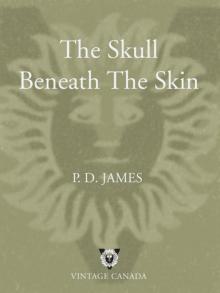 The Skull Beneath the Skin
The Skull Beneath the Skin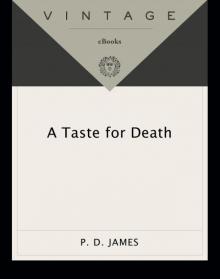 A Taste for Death
A Taste for Death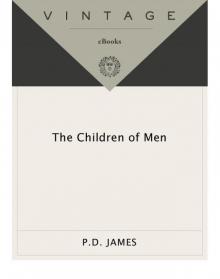 The Children of Men
The Children of Men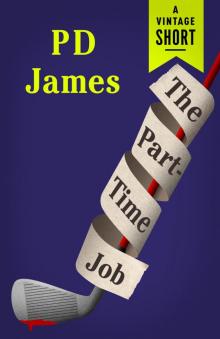 The Part-Time Job
The Part-Time Job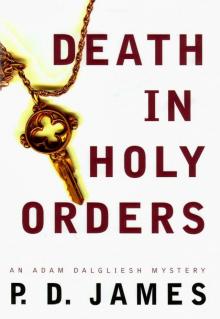 Death in Holy Orders
Death in Holy Orders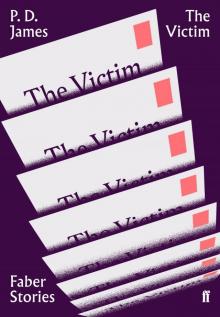 The Victim
The Victim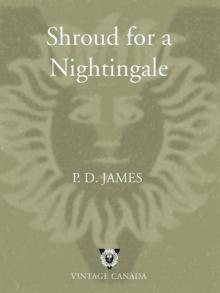 Shroud for a Nightingale
Shroud for a Nightingale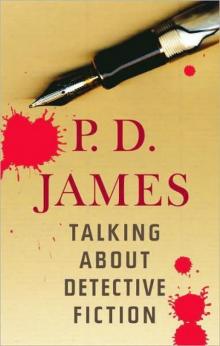 Talking about Detective Fiction
Talking about Detective Fiction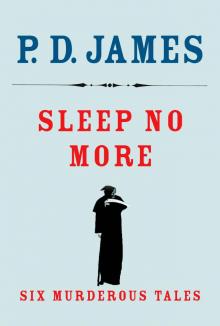 Sleep No More
Sleep No More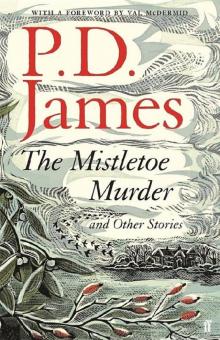 The Mistletoe Murder and Other Stories
The Mistletoe Murder and Other Stories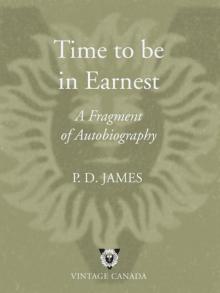 Time to Be in Earnest
Time to Be in Earnest Original Sin
Original Sin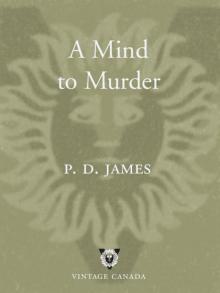 A Mind to Murder
A Mind to Murder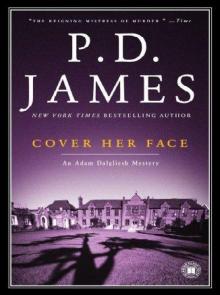 Cover Her Face
Cover Her Face Innocent Blood
Innocent Blood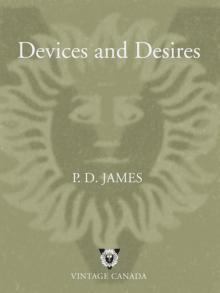 Devices and Desires
Devices and Desires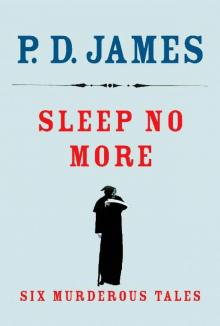 Sleep No More: Six Murderous Tales
Sleep No More: Six Murderous Tales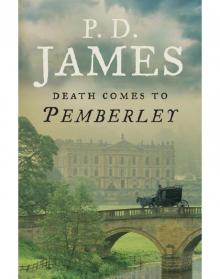 Death Comes to Pemberley
Death Comes to Pemberley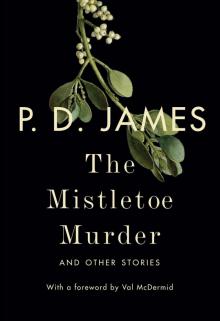 The Mistletoe Murder
The Mistletoe Murder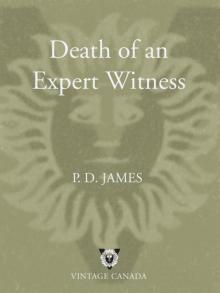 Death of an Expert Witness
Death of an Expert Witness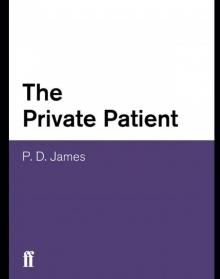 The Private Patient
The Private Patient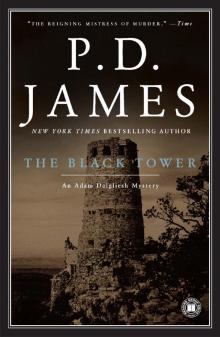 The Black Tower
The Black Tower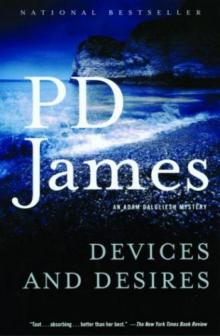 Devices & Desires - Dalgleish 08
Devices & Desires - Dalgleish 08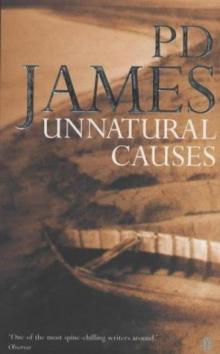 Unnatural Causes
Unnatural Causes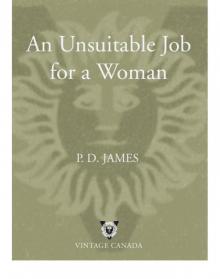 An Unsuitable Job for a Woman
An Unsuitable Job for a Woman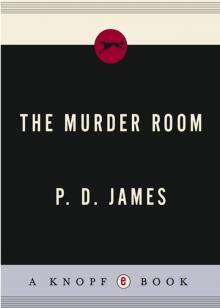 The Murder Room
The Murder Room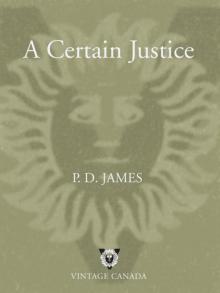 A Certain Justice
A Certain Justice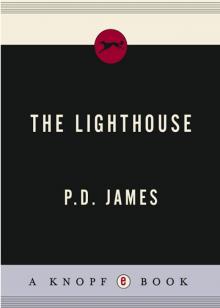 The Lighthouse
The Lighthouse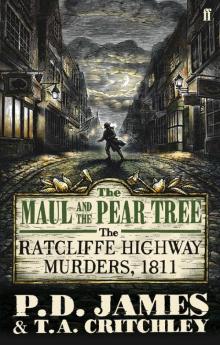 The Maul and the Pear Tree
The Maul and the Pear Tree